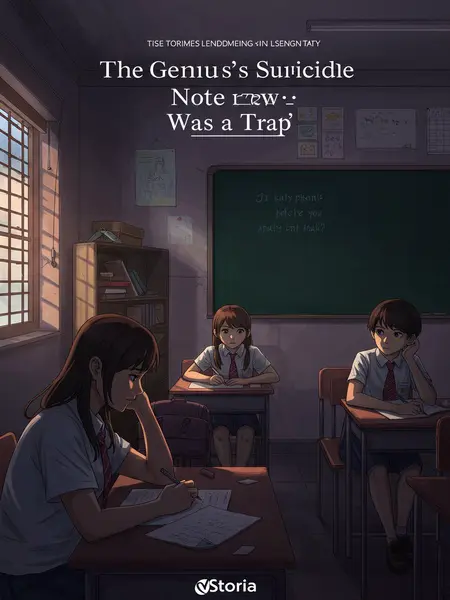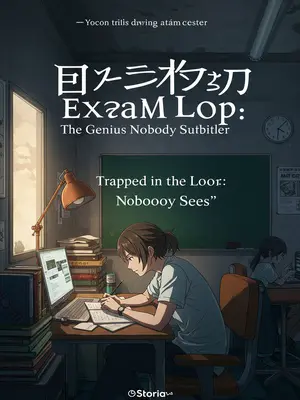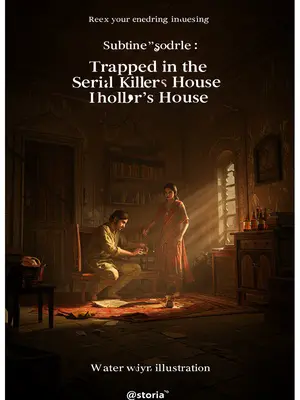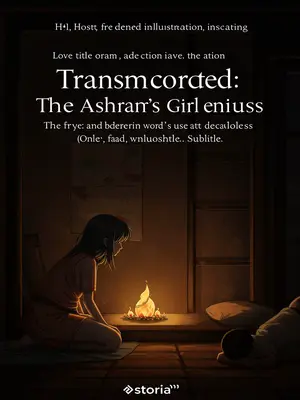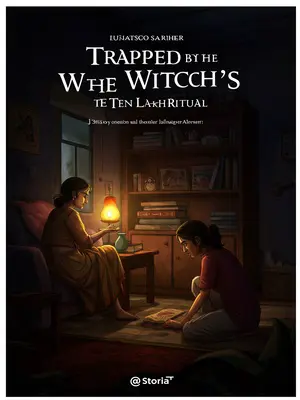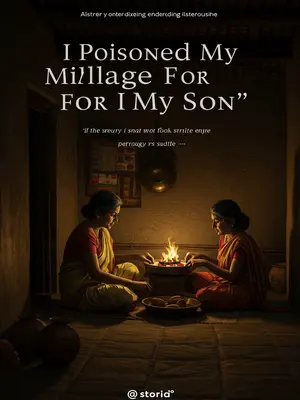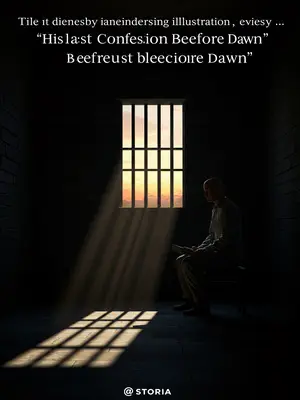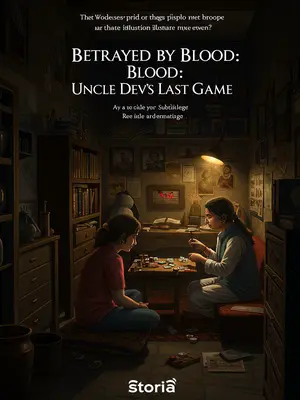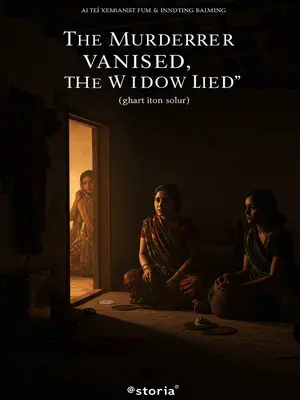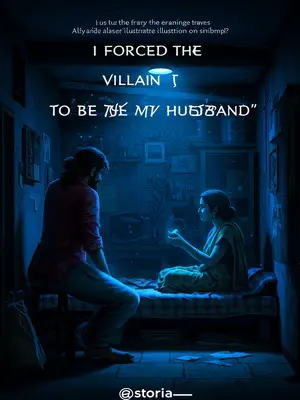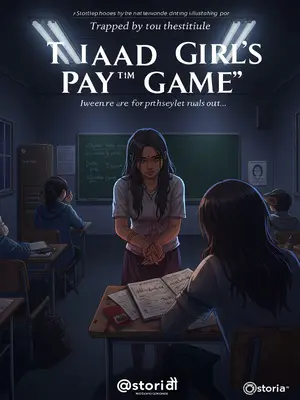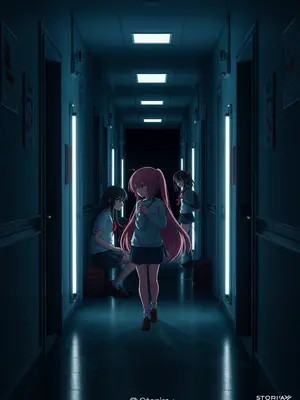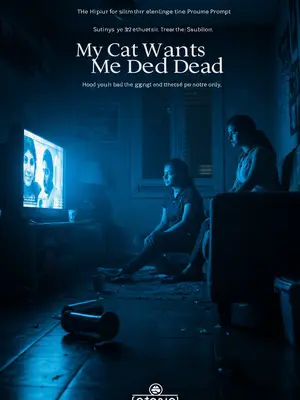Chapter 4: The Truth in Numbers
At the time, we had also considered the possibility of bullying or other juvenile crimes.
We checked records, spoke to teachers, asked around. But nothing concrete ever surfaced.
But the victim was dead, and his parents didn’t press charges. Less trouble, the better.
That was the way things went in small towns. No family wants their child’s name dragged through the mud. Best to keep quiet, move on.
Unexpectedly, Rajesh Singh never accepted our investigation and insisted on finding the truth himself.
He was relentless—calling the station, writing letters, chasing after every rumour. I began to dread seeing his name on the office register.
And the one he chose to judge was my son.
For the first time, I realised the true danger I had brought upon my own family.
Twenty-five minutes left.
The clock on the wall seemed to tick louder and louder. Every second was a hammer blow to my nerves.
Rajesh Singh was calm and collected.
He even smiled at my desperation, as if enjoying my agony. The man was stone—nothing fazed him.
Clearly, all this was part of his plan.
The pieces fit too neatly, every move countered, every plea ignored. My mind raced for a way out.
I took a deep breath, pulled out a Classic Milds cigarette, and lit it, letting the nicotine steady me.
The smoke curled up towards the ceiling, its smell oddly comforting in that tense moment.
I asked, “Want one?”
He nodded, extending his hand with the nonchalance of a man who had all the time in the world.
He gestured for a cigarette.
I passed him one, struck a match, lit his cigarette, and then my own. For a moment, we sat in silence, smoke hanging between us.
I lit one for him and said, “Let’s talk about the exam.”
My voice was quiet, almost pleading. I hoped that somewhere in this small act of camaraderie, he might find a shred of mercy.
After Rohan’s suicide, I went through his belongings and found his suicide note.
I kept it locked in my desk drawer for weeks, unable to bring myself to read it. When I finally did, my hands shook so badly I almost tore the page.
It read:
Dad, I don’t want to die.
But I have no choice.
You and I are both outcasts, misfits in our world.
You told me the story of Chanakya, the story of Bhagat Singh, the story of Socrates.
You used their stories to encourage me, to tell me to stay true to myself and not live for others’ approval.
But—
Chanakya was forced to live in exile.
Bhagat Singh was hanged.
Socrates drank poison in prison.
Dad, you were wrong.
We’re just different, Papa. They call it Asperger’s. You never saw a doctor, but I know now. I tried to change. I tried so hard.
I resolved to change myself, to fit in with them.
They pretended to accept me, but only used me to help them cheat.
But once things were exposed, they didn’t care if their own futures were ruined, but mine would be destroyed too.
I refused.
Then they started bullying me, trying to break me.
In the canteen, they pretended to invite me to sit with them, but before I sat down, they stuck acupuncture needles into the corn cob on my seat. When I sat, the pain made me want to scream, but they shushed me;
They knew I was shy and pushed me into the girls’ washroom, then accused me of being a pervert;
A classmate stole his police officer father’s handcuffs and cuffed me in a pigsty all night.
…
Later, they discovered my secret.
They used it to threaten me. If I didn’t help them cheat, they would expose my secret to everyone.
I had no choice but to agree.
The subject they struggled with most was maths; their weakest subject was also maths.
So, the subject I helped them cheat in was maths.
But with the strict invigilation of the board exam, how could cheating be possible?
Unless—someone created chaos.
And the best chaos is a student jumping from a building.
While the invigilators are distracted, pass the answers around.
This secret is everything to me, and I’m willing to protect it with my life.
Besides, I no longer wish to live.
Let the board exam be my final performance.
I want to achieve the most dazzling grades, then say goodbye to this world in everyone’s admiration and amazement.
Like fireworks, fading at the brightest moment.
Dad, you’ve already been to jail once. Don’t do anything foolish again.
Don’t worry about who they are.
Don’t worry about what the secret is.
At the end of the math problem, I left a sequence of numbers. In those numbers is what I most want to tell you.
I was stunned.
The truth hit me like a slap from fate. All those late-night lectures, all those stories—I never once thought to ask if my son was happy, or if he was simply surviving.
My handcuffs had been taken by Kabir to play with. He later washed and returned them, but they still smelled faintly of pig.
It seemed like a small thing at the time—a boy being mischievous. Now, it felt like the last piece of a puzzle I didn’t want to solve.
For that, I gave him a good shouting.
I remember his sulking face, the tears he tried to hide. I brushed it off, busy with my own worries. How little I understood.
I never imagined that little brat had used my handcuffs to lock up Rohan.
The thought made my skin crawl. I had been so proud of Kabir, never once suspecting what he was capable of.
Before the board exam, Kabir told me he was sitting behind the exam genius Rohan, so he would definitely pass the high school cutoff this time.
I had laughed, thinking it was a joke. “Arrey, Kabir, don’t rely on others. Work hard, beta!” I never thought he meant it literally.
I’d already given up hope for his studies and didn’t take it seriously.
Like every other middle-class father, I grumbled about marks, but deep down, I just wanted him to find his own path.
I never expected he’d pass by forcing Rohan to help him cheat.
My head spun. What kind of father was I? What kind of son had I raised?
No—something still doesn’t add up.
Doubt gnawed at me. There had to be more to the story.
I called Amit and told him to bring me Rohan’s post-mortem report immediately.
He arrived within minutes, the file trembling in his hands. I snatched it from him, flipping through the pages.
I read it word by word in front of Rajesh Singh, until I saw the forensic doctor’s signature and stamp.
Every line was like a hammer blow. I looked up, daring Rajesh Singh to contradict it.
I threw the report at Rajesh Singh and shouted, “You’re lying! We did a thorough forensic exam of Rohan’s body. Apart from the multiple fractures and internal injuries from the fall, there were no old injuries.”
He didn’t flinch. Just picked up the file, glanced at it, and tossed it aside.
He finished his cigarette, spat out the butt, and looked at me provocatively: “Is there always evidence of bullying?”
His voice was soft, almost mocking. The kind of voice that makes your skin crawl.
I couldn’t take it anymore. I drew my handcuffs from my belt and gripped them tightly, warning him: “Rajesh Singh, don’t play games. I’ll ask you one last time—where is Kabir? If you don’t talk, you’ll regret it.”
My voice shook with rage. I didn’t care anymore—about the law, about my badge, about anything but my son.
As I spoke, I pulled back my fist, handcuffs in hand, and aimed at his face. I hesitated, glancing at the small Ganesha idol again, but anger won over restraint.
The metal glinted in the harsh fluorescent light. My arm trembled with the effort of holding back.
That fellow was still mocking me. “Oh, the upright Officer Sharma, who never used violence, now wants to take matters into his own hands? Maybe I misjudged you. If you’re a man, hit me. If not, you’re a coward—no wonder your brat bullies the weak.”
He spat out the words, daring me. My vision blurred with anger.
I lost control and punched him hard on the left cheek.
The crack echoed in the tiny room. He staggered, but didn’t cry out. Blood dripped onto the table, pooling in the grain of the wood.
Police handcuffs are made of stainless steel. I used about seventy or eighty percent of my strength. His face split open, muscle exposed, blood streaming down, and he even licked it with his tongue.
He grinned, red teeth flashing. My hand throbbed, guilt and rage tangled in my chest. I stared at the blood on my knuckles, wondering what line I’d just crossed.
I threatened again, “Rajesh Singh, will you talk or not? If not, I’ll make your life a living hell.”
My voice was raw, desperate. I was on the verge of breaking.
He grinned, baring blood-red teeth. “Officer Sharma, the secret to your son’s disappearance is in that string of numbers. If you can’t solve it, let’s make a deal.”
For the first time, I sensed he was holding all the cards, and I was just a pawn in his game.
I asked, “Bol, kya chahiye tujhe? What’s your demand?”
“Clue for evidence.”
He leaned back, wiping blood from his cheek. His eyes gleamed with a dangerous intelligence.
Rajesh Singh finally revealed his true intentions.
His lips twisted into a half-smile, as if he’d been waiting for this moment.
“What evidence do you want?”
“The audio and video recordings of your DCP Prakash interrogating me on March 25 and 27, 2000.”
The request hit me like a slap from fate. Those days were etched in my memory—the screams, the confessions, the tension in the air. I swallowed hard.
Before this, even though I hated Rajesh Singh for kidnapping my son, I still felt some sympathy for him.
I could almost understand his pain—a father pushed to the edge. But this was something else, something monstrous.
If my son had been forced to his death, maybe I’d also take desperate revenge.
But not like this. Not at the cost of another child’s life.
But now, I realised Rajesh Singh was nothing like I’d imagined.
The man before me was cunning, manipulative—a true predator.
He was a complete scoundrel, a beast, a bastard.
My hands shook with the urge to strike him again.
“You want to use your son’s death to overturn your rape conviction?”
I spat out the words, disgust rising in my throat.
I couldn’t fathom such a father.
How could any man use his child’s tragedy for personal gain?
He glared at me, viciously: “Yes. I want to overturn the rape case. Back then, you convicted me solely on my confession. If you provide evidence of torture, my confession can be thrown out. Without it, the evidence chain breaks and I can be acquitted.”
His words echoed off the walls, cold and precise.
I looked at the always-clever Rajesh Singh as if he were a fool. “Do you think any cop would be dumb enough to torture a suspect under surveillance?”
I leaned forward, narrowing my eyes. “There are cameras in every room. You think you’ll find proof?”
Rajesh Singh smirked. “Officer Sharma, are you sure you didn’t?”
He held my gaze, unblinking. The question hung in the air like a curse.
That fellow—what kind of monster does he take me for?
I stared at him, refusing to let him see my doubt.
I said firmly, “No.”
My voice rang out, stronger than I felt.
“Fine. To show my sincerity, I’ve already given you the first clue. You weren’t calm, you didn’t listen or think carefully. You need to put yourself in my shoes: if you were me, what would you do?”
His words echoed in my mind, circling like vultures. What would I do, if our places were switched?
I calmed down, looked at the handcuffs in my hand, and suddenly understood.
A memory surfaced—the pigsty, the smell, the shame. It all clicked into place.
“You mean the pig farm?”
I whispered the words, my mouth suddenly dry. Rajesh Singh just smiled, a predator’s smile.
